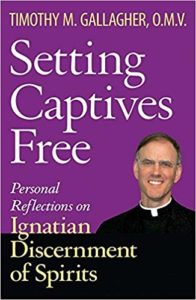Podcast: Play in new window | Download (Duration: 10:56 — 7.6MB) | Embed
Subscribe: Apple Podcasts | Spotify | Amazon Music | Android | Pandora | iHeartRadio | JioSaavn | Podchaser | Gaana | Podcast Index | Email | TuneIn | Deezer | Anghami | RSS | More
 Thursday of the Twenty-First Week in Ordinary Time – A Time of Lectio Divina for the Discerning Heart Podcast
Thursday of the Twenty-First Week in Ordinary Time – A Time of Lectio Divina for the Discerning Heart Podcast
As you begin, take a deep breath and exhale slowly. For at least the next few moments, surrender all the cares and concerns of this day to the Lord.
Say slowly from your heart “Jesus, I Trust In You…You Take Over”
Become aware that He is with you, looking upon you with love, wanting to be heard deep within in your heart…
From the Holy Gospel According to Matthew 24:42-51
Jesus said to his disciples: ‘Stay awake, because you do not know the day when your master is coming. You may be quite sure of this, that if the householder had known at what time of the night the burglar would come, he would have stayed awake and would not have allowed anyone to break through the wall of his house. Therefore, you too must stand ready because the Son of Man is coming at an hour you do not expect.
‘What sort of servant, then, is faithful and wise enough for the master to place him over his household to give them their food at the proper time? Happy that servant if his master’s arrival finds him at this employment. I tell you solemnly, he will place him over everything he owns. But as for the dishonest servant who says to himself, “My master is taking his time,” and sets about beating his fellow servants and eating and drinking with drunkards, his master will come on a day he does not expect and at an hour he does not know. The master will cut him off and send him to the same fate as the hypocrites, where there will be weeping and grinding of teeth.’
What word made this passage come alive for you?
What did you sense the Lord saying to you?
Once more give the Lord an opportunity to speak to you:
Jesus said to his disciples: ‘Stay awake, because you do not know the day when your master is coming. You may be quite sure of this, that if the householder had known at what time of the night the burglar would come, he would have stayed awake and would not have allowed anyone to break through the wall of his house. Therefore, you too must stand ready because the Son of Man is coming at an hour you do not expect.
‘What sort of servant, then, is faithful and wise enough for the master to place him over his household to give them their food at the proper time? Happy that servant if his master’s arrival finds him at this employment. I tell you solemnly, he will place him over everything he owns. But as for the dishonest servant who says to himself, “My master is taking his time,” and sets about beating his fellow servants and eating and drinking with drunkards, his master will come on a day he does not expect and at an hour he does not know. The master will cut him off and send him to the same fate as the hypocrites, where there will be weeping and grinding of teeth.’
What did your heart feel as you listened?
What did you sense the Lord saying to you?
Once more, through Him, with Him and in Him listen to the Word:
Jesus said to his disciples: ‘Stay awake, because you do not know the day when your master is coming. You may be quite sure of this, that if the householder had known at what time of the night the burglar would come, he would have stayed awake and would not have allowed anyone to break through the wall of his house. Therefore, you too must stand ready because the Son of Man is coming at an hour you do not expect.
‘What sort of servant, then, is faithful and wise enough for the master to place him over his household to give them their food at the proper time? Happy that servant if his master’s arrival finds him at this employment. I tell you solemnly, he will place him over everything he owns. But as for the dishonest servant who says to himself, “My master is taking his time,” and sets about beating his fellow servants and eating and drinking with drunkards, his master will come on a day he does not expect and at an hour he does not know. The master will cut him off and send him to the same fate as the hypocrites, where there will be weeping and grinding of teeth.’
What touched your heart in this time of prayer?
What did your heart feel as you prayed?
What do you hope to carry with you from this time with the Lord?
Our Father, who art in heaven,
hallowed be thy name.
Thy kingdom come.
Thy will be done on earth, as it is in heaven.
Give us this day our daily bread,
and forgive us our trespasses,
as we forgive those who trespass against us,
and lead us not into temptation,
but deliver us from evil.
Amen





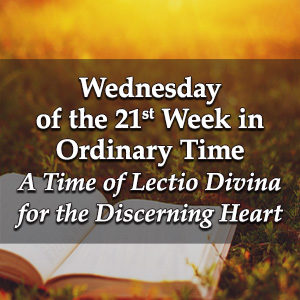 Wednesday of the Twenty-First Week in Ordinary Time – A Time of Lectio Divina for the Discerning Heart Podcast
Wednesday of the Twenty-First Week in Ordinary Time – A Time of Lectio Divina for the Discerning Heart Podcast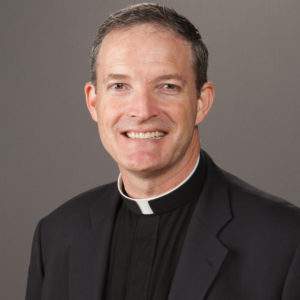
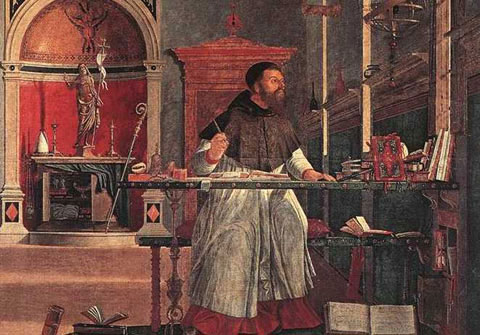
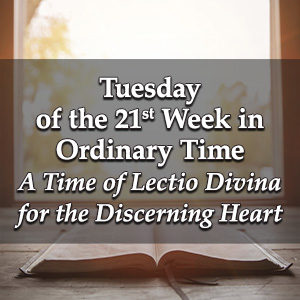 Tuesday of the Twenty-First Week in Ordinary Time – A Time of Lectio Divina for the Discerning Heart Podcast
Tuesday of the Twenty-First Week in Ordinary Time – A Time of Lectio Divina for the Discerning Heart Podcast
